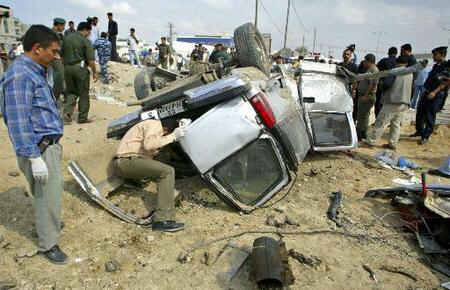 Deaths
which occurred on an October 15: Deaths
which occurred on an October 15:
2003
Joseph Bagarozza, 35; Pio Canini, 52; Vincent Ferrante, 26; Louis Robinson,
50; John Valinski, 40; all 5 from Staten Island -- John
P. Healy, 44; Frank Sullivan, 46; both from Middletown NJ
--Darios M. Marshall, 25, from Manhattan; --Guillermo Pagvay,
44, from Queens; and a 42-year-old woman; when
95-meter-long, 3335-ton, 22-year-old Manhattan
to Staten Island ferry Andrew J. Barberi, carrying some 1500
passengers (its capacity is 6000), crashes its forward port side into pilings
at its Staten Island terminal at 15:21 (19:21 UT). Some 45 persons are injured.
The pilot, Assistant Capt. Richard J. Smith, 55, whose loss of consciousness
caused the accident, flees 5 km to his home, slashes his wrists and shoots
himself twice in the chest with a pellet gun; he survives.
2003
John Branchizio, 36; Mark T. Parson, 31; and John Martin Linde Jr., 30;
US security guards in armored van torn in half and overtuned by a remote-controlled
roadside bomb at 10:15 (07:15 UT) near Beit Hanoun, in the Gaza Strip, a
couple of kilometers south of the Erez border checkpoint. One US security
guard is wounded. The vehicle was the third in a convoy of four vehicles
escorting US diplomats on their way to Gaza City to interview applicants
for Fulbright scholarships. The security guards were employees of DynCorp,
a Virginia-based security firm contracted by the US embassy in Israel. —
[the van being examined >]. — A few hours later US
investigators have to retreat when pelted by stones by a dozen youths in
a crowd of some 200 Palestinians chanting “Allahu akbar”.
2003 A militant of the Popular Front from the Liberation
of Palestine, shot by Israeli soldiers at roadblock at Enbata near Tul Karm,
West Bank, when he tries to escape.
2003 The driver of
concrete-mixer, after it overturns near West Bank enclave settlement
Shavei Shomron.
2003 George Matar, 57, Christian
Arab Israeli, injured in the 04 October
2003 suicide bombing of Maxim's Restaurant (of one of whose owners he
was a relative), becomes the 21st killed by it.
2003 Moktar
Ould Daddah, born in 1924, ruler of Mauritania from its 28 November
1960 independence (from France) to his 1978 overthrow by a military junta
which jailed him for 15 months after which he went into exile in Tunisia
and France.
2003 Benny Levy, of a heart attack,
French Jewish philosopher and author. He was born in Cairo on 28 August
1945, was prominent Marxist-Leninist rebel student “Pierre Victor”
in 1968, but later turned to Jewish piety and moved to Israel.
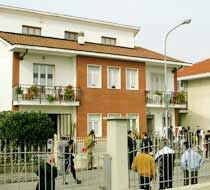 2002
Carla Bergamin, 40, her widowed mother Teresa Bergamin, brother Sergio Bergamin
and his wife Margherita Bergamin, retired neighbors Decio Renato Guerra
and wife Laura Guerra, one other man, and Mauro Antonello, 40,
Carla's ex-husband (they separated in 2000), a night watchman, who at 08:45,
with some 40 shots from four legal guns from his collection, kills the seven
and then himself, in via Parini 5 and 3 [photo >], Chieri,
20 km south-east of Turin, Italy. Carla's and Mauro's daughter, 7, has left
on the school bus a few minutes earlier to go to Borgo Venezia Elementary
(the bus driver Antonio Lancellotti had instructions from Carla never to
let Mauro take the girl off the bus). The neighborhood is known as Borgo
Venezia, all the victims are of Venetian origin. — La prima ad essere
caduta è stata la ex moglie. Agli spari accorrono i coniugi Guerra che vengono
a loro volta uccisi. Mauro Antonello salta poi la recinzione che separa
il numero civico 5 dal numero 3 ed entra in un' officina laboratorio dei
Bergamin, specializzata in lavorazioni tessili. Lì ammazza due donne, una
è Margherita Bergamin, la moglie di Sergio, l'altra la persona di cui non
si conoscono ancora le generalità. Poi, nel giardino fra le due case, incontra
Sergio e Teresa Bergamin e li uccide. Infine sale in mansarda, si siede
sul divano, si punta il revolver alla tempia e fa fuoco togliendosi la vita.
Daniele e Andrea Bergamin, di 18 e 20 anni, figli di Sergio e Margherita,
si sono salvati perchè sono usciti di casa pochi prima della strage: Daniele
per andare a Castelnuovo Don Bosco (paese a pochi chilometri da Chieri),
dove frequenta un istituto tecnico, Andrea per un corso di informatica. 2002
Carla Bergamin, 40, her widowed mother Teresa Bergamin, brother Sergio Bergamin
and his wife Margherita Bergamin, retired neighbors Decio Renato Guerra
and wife Laura Guerra, one other man, and Mauro Antonello, 40,
Carla's ex-husband (they separated in 2000), a night watchman, who at 08:45,
with some 40 shots from four legal guns from his collection, kills the seven
and then himself, in via Parini 5 and 3 [photo >], Chieri,
20 km south-east of Turin, Italy. Carla's and Mauro's daughter, 7, has left
on the school bus a few minutes earlier to go to Borgo Venezia Elementary
(the bus driver Antonio Lancellotti had instructions from Carla never to
let Mauro take the girl off the bus). The neighborhood is known as Borgo
Venezia, all the victims are of Venetian origin. — La prima ad essere
caduta è stata la ex moglie. Agli spari accorrono i coniugi Guerra che vengono
a loro volta uccisi. Mauro Antonello salta poi la recinzione che separa
il numero civico 5 dal numero 3 ed entra in un' officina laboratorio dei
Bergamin, specializzata in lavorazioni tessili. Lì ammazza due donne, una
è Margherita Bergamin, la moglie di Sergio, l'altra la persona di cui non
si conoscono ancora le generalità. Poi, nel giardino fra le due case, incontra
Sergio e Teresa Bergamin e li uccide. Infine sale in mansarda, si siede
sul divano, si punta il revolver alla tempia e fa fuoco togliendosi la vita.
Daniele e Andrea Bergamin, di 18 e 20 anni, figli di Sergio e Margherita,
si sono salvati perchè sono usciti di casa pochi prima della strage: Daniele
per andare a Castelnuovo Don Bosco (paese a pochi chilometri da Chieri),
dove frequenta un istituto tecnico, Andrea per un corso di informatica.
2002 Condor, 5-months old, seen dead in a cave in
the Sespe Condor Sanctuary, in the Los Padres National Forest, Calfornia.
Its mother was found to have high levels of lead, which may have been passed
on to the egg. It was among the first condor chicks hatched in the wild
in nearly two decades; the
first one was found dead on 04 October 2002. Captive breeding has incresed
the number of California condors in the world from 22 (in 1982) to 205 (as
of 01 September 2002), 73 of them in the wild in California and Arizona.
2001 Ahmed Marshoud, Hamas militant, by explosion
in a car parked outside a Nablus office in view of an Israeli position on
a nearby hilltop.
1999 David Saenz, 57, shot in
the head by Ramon Cabrera, 48, because Saenz did not know the tune of “El
Guajolote” which Cabrera had asked him to play, as Saenz was entertaining
neighbors with his guitar and accordion in his yard, in Corpus Christi.
On 9 March 2001, Cabrera would be sentenced to 99 years in prison, with
possible parole after 30 years.
1990 Magnus,
mathematician
1987 Thomas Sankara,. presidente de
Burkina Faso, en un golpe de Estado dado por Blaise Compaoré.
1983
Five snipers at Beirut International Airport, shot by US Marine
sharpshooters
1981 Rafael Dieste, escritor español.
1965 Fraenkel,
mathematician
1964 Cole Porter composer
1959
Fejér,
mathematician
1946 Herman Goering, suicide
by poison, on the eve of his scheduled hanging.
^top^
Herman Goering, commander in chief of the Luftwaffe, president of
the Reichstag, head of the Gestapo, prime minister of Prussia, chief
forester of the Reich, chief liquidator of sequestered estates, supreme
head of the National Weather Bureau, and Hitler's designated successor
dies by his own hand. Goering was an early member of the Nazi Party
and was wounded in the failed Munich Beer Hall Putsch in 1923. That
wound would have long-term effects, as Goering became increasingly
addicted to painkillers.
Not
long after Hitler's accession to power, Goering was instrumental in
creating concentration camps for political enemies. Ostentatious and
self-indulgent, he changed his uniform five times a day and was notorious
for flaunting his decorations, jewelry, and stolen artwork. It was
Goering who ordered the purging of German Jews from the economy following
the Kristallnacht pogrom in 1938, initiating an "Aryanization" policy
that confiscated Jewish property and businesses. Goering's failure
to win the Battle of Britain and prevent the Allied bombing of Germany
led to his loss of stature within the Party, aggravated by the low
esteem with which he was always held by fellow officers because of
his egocentrism and position as Hitler's right-hand man. As the war
progressed, he dropped into depressions and continued to battle drug
addiction. When Goering fell into US hands after Germany's surrender,
he had in his possession a rich stash of paracodin pills, a morphine
derivative.
He was charged with
various crimes against humanity and tried by the International War
Crimes Tribunal in Nuremberg. Despite a vigorous attempt at self-acquittal,
he was found guilty and, along with ten other high-ranking Nazi officials,
sentenced to be hanged, but before he could be executed, he committed
suicide by swallowing a cyanide tablet he had hidden from his guards. |
1945 Pierre Laval.
^top^
The puppet prime minister of Nazi-occupied Vichy France, is executed
by a firing squad for treason against France. Laval, originally a
deputy and senator of pacifist tendencies, shifted to the right in
the 1930s while serving as the French premier and minister of foreign
affairs. A staunch anti-Communist, Laval delayed the Soviet-Franco
pact of 1935 and sought to align France with Fascist Italy. Hostile
to the declaration of war against Germany in 1939, Laval encouraged
the antiwar faction in the French government, and with the German
invasion in 1940 used his political influence to force an armistice
with Germany. Laval offered the new Vichy state to Phillipe Pétain,
and as Pétain's deputy encouraged the Vichy government in full
collaboration with the Nazi programs of oppression and genocide.
By 1942, Laval had won the trust of
Nazi leader Adolf Hitler, and the elderly Pétain became merely
a figurehead in the Vichy regime. After the Allied liberation of France,
Laval fled to German protection to the east. With the defeat of Germany
in May of 1945, he escaped to Spain, but was expelled and went into
hiding in Austria, where he finally surrendered to US authorities
on 31 July. Extradited to France, Laval was convicted of treason by
the High Court of Justice in a sensational trial. Condemned to death,
he attempted suicide by poison, but was nursed back to health in time
for his execution. |
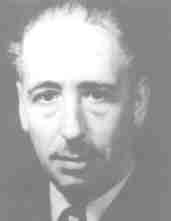
1940 Lluís Companys,
58, afusellat al Castell de Montjuïc de Barcelona
^top^
Advocat sindicalista durant el primer
terç del segle i dirigent d'Esquerra Republicana de Catalunya, participà
en la victòria electoral del seu partit l'any 1931, al costat de Francesc
Macià. Primer president del Parlament de Catalunya l'any 1932, en
morir Francesc Macià l'any 1933 fou elegit President de la Generalitat.
Hagué de governar en una època de grans commocions socials i polítiques,
sobretot en el període de la guerra civil espanyola de 1936-1939.
Refugiat a França, després de la victòria del general Franco, fou
detingut a la Baule per la polícia militar alemanya, lliurat al Govern
de Madrid i condemnat a mort per un tribunal militar.
|
1933 Raymond Poincaré, presidente francés.
1923
Angiolo (or Agniolo) Tommasi, Italian artist born in 1858.
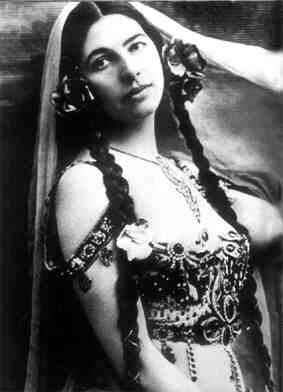 1917
Margaretha Geertruida Zelle Macleod "Mata Hari" executed by firing
squad ^top^ 1917
Margaretha Geertruida Zelle Macleod "Mata Hari" executed by firing
squad ^top^
Mata Hari, the archetype of
the seductive female spy, is executed for espionage by a French firing
squad at the Vincennes barracks outside of Paris. Mata Hari first
came to Paris in 1905, and found fame as a performer of exotic Indian-inspired
dances in the Parisian salons. Mata Hari soon began touring all over
Europe, telling the story of how she was born in a sacred Indian temple
and taught ancient Indian dances by a priestess who gave her the name
Mata Hari, meaning "eye of the dawn.”
In reality, Mata Hari was born in a small town in northern Holland,
and her real name was Margaretha Geertruida Zelle Macleod. However,
regardless of the authenticity of her eastern origins, Mata Hari packed
dance halls from Russia to America, largely due to her willingness
to dance almost entirely naked in public. Mata Hari was also a famous
courtesan in European society, and with the outbreak of World War
I her catalogue of lovers began to include high-ranking French officers.
. In February 1917, French authorities
arrested Mata Hari for espionage and imprisoned her at St. Lazare
Prison in Paris. In a military trial conducted in July, she was accused
of revealing details of the Allies' new weapon, the tank, resulting
in the deaths of thousands of soldiers. She was convicted and sentenced
to death, and on October 15 she refused a blindfold and was shot to
death by a firing squad at Vincennes.
There is some evidence that Mata Hari acted as a German spy, and for
a time as a double agent for the French, but the Germans had written
her off as an ineffective agent whose pillow talk had produced little
intelligence of value. Her military trial was riddled with bias and
circumstantial evidence, and it is probable that French authorities
trumped her up as "the greatest woman spy of the century" as a distraction
for the huge losses the French army was suffering on the western front.
Her only real crimes may have been an elaborate stage fallacy and
a weakness for men in uniform.
Elle inspira écrivains et cinéastes pour devenir l’espionne la plus
célèbre du centenaire. Mata Hari, de son vrai nom Margaretha Geertruida
Zelle, est une séduisante Hollandaise initiée aux danses orientales
en Indonésie aux côtés de son mari, officier de la coloniale néerlandaise,
et qui a défrayé la chronique entre 1914 et 1917 en espionnant les
puissances de l’Entente au profit de l’Allemagne. Dans sa villa du
bois de Boulogne, dans la région parisienne, elle charme les officiers
français et anglais, obtient habilement des secrets militaires de
leur part et, durant trois années, les transmettait en Allemagne.
Elle n’est démasquée qu’en 1917 quand les services secrets français
la surprennent à Lisbonne avec un officier allemand. Traduite devant
un tribunal militaire à Paris, elle est convaincue d’espionnage et
fusillée le 15 octobre 1917. Elle n’a pas cessé de clamer son innocence.
La belle Greta Garbo l’immortalisa au cinéma où son histoire fut adaptée
en 1932 dans un film du réalisateur Fietzmaurice, en campant magistralement
son personnage. |
1892 Four members of Dalton gang. An attempt to rob two
banks in Coffeyville, Kan., ends in disaster for the Dalton gang as four
of the five outlaws are killed and Emmet Dalton is seriously wounded.
1880 Victorio, great Chiricahua
Apache warrior, and over 100 of his braves.
^top^
The warrior Victorio, one of the greatest Apache military strategists
of all time, dies in the Tres Castillos Mountains south of El Paso,
Texas. Born in New Mexico around 1809, Victorio grew up during a period
of intense hostility between the native Minbreño Apache Indians
of the southwest and encroaching Mexican and American settlers. Determined
to resist the loss of his homeland, Victorio began leading his small
band of warriors on a long series of devastating raids against Mexican
and American settlers and their communities in the 1850s. After more
than a decade of evading the best efforts of the Mexican and American
armies to capture him, the US Army managed to convince Victorio to
accept resettlement of his people on an inhospitable patch of sunburnt
land near San Carlos, Arizona, in 1869.
But with summer temperatures reaching above 40ºC on the San Carlos
reservation (an area also known as Hell's Forty Acres) and farming
nearly impossible, Victorio decided the new reservation was unacceptable
and moved his followers to more pleasant grounds at Ojo Caliente (Warm
Springs), thus again becoming an outlaw in the eyes of the United
States. In 1878, the US Army attempted to force the Apaches back to
the San Carlos reservation, but Victorio eluded capture, disappearing
into the desert with 150 braves. Surviving by raiding the towns and
farms of Chihuahua, Mexico, Victorio and his men began to take bloody
revenge against their enemies, ambushing US troops with devastating
effect and killing any Mexican or American sheepherder unfortunate
enough to cross their path.
In 1880, a combined force of US and Mexican troops finally succeeded
in tracking down the wily Apache and his warriors, surrounding them
in the Tres Castillos Mountains of Mexico, just south of El Paso,
Texas. Having sent the American troops away, the Mexican soldiers
proceeded to kill all but 17 of the trapped Apaches, though the exact
manner of Victorio's death remains unclear. Some claimed an Indian
scout employed by the Mexican army killed the famous warrior. But
according to the Apache, Victorio took his own life rather than surrender
to the hated Mexicans. Regardless of how it happened, Victorio's death
made him a martyr to the Apache people and strengthened the resolve
of other warriors to continue the fight. The last of the great Apache
warriors, Geronimo, would not surrender until 1886. |
1875 Friedrich Wilhelm Heinrich Theodor Hosemann, German
genre painter and lithographer born on 24 September 1807. — more
with links to two images.
1863 Horace Lawson Hunley and
7 of crew of his sub, which sinks during tests.
^top^
For
the second time, , the first successful submarine, the Confederate
submarine H L Hunley sinks during a practice dive in Charleston
Harbor, this time drowning its inventor along with seven crew members
Horace Lawson Hunley developed
the submarine from a cylinder boiler. It was operated by a crew of
eight--one person steered while the other seven turned a crank that
drove the ship's propeller. The Hunley could dive, but it required
calm seas for safe operations. It was tested successfully in Alabama's
Mobile Bay in the summer of 1863, and Confederate commander General
Pierre G.T. Beauregard recognized that the vessel might be useful
to ram Union ships and break the blockade of Charleston Harbor. The
Hunley was placed on a railcar and shipped to South Carolina. The
submarine experienced problems upon its arrival. During a test run,
a crewmember became tangled in part of the craft's machinery and the
craft dove with its hatch open; only two men survived the accident.
The ship was raised and repaired, but it was difficult to find another
crew that was willing to assume the risk of operating the submarine.
Its inventor and namesake stepped forward to restore confidence in
his creation. On October 15, he took the submarine into Charleston
Harbor for another test. In front of a crowd of spectators, the Hunley
slipped below the surface and did not reappear. Horace Hunley and
his entire crew perished. Surprisingly, another willing crew was assembled
and the Hunley went back into the water. On February 17, 1864, the
ship headed out of Charleston Harbor and approached the USS. Housatanic.
The Hunley stuck a torpedo into the Yankee ship and then backed away
before the explosion. The Housatanic sank in shallow water, and the
Hunley became the first submarine to sink a ship in battle. Unfortunately,
its first successful mission was also its last--the Hunley sank before
it returned to Charleston, taking yet another crew down with it. The
vessel was raised on August 8, 2000, and will now reside in an exhibit
at the Charleston History Museum. |
1841 Diego de León, general fusilado en Madrid por su frustrado
asalto al Palacio Real.
1829 Georges Dawe, English
portrait
painter and writer born on 08 February 1781. — MORE
ON DAWE AT ART “4” OCTOBER
with links to images.
1813 Tecumseh. During the land
defeat of the British on the Thames River in Canada, the Indian chief Tecumseh,
now a brigadier general with the British Army (War of 1812).
1811
Sir Nathaniel Dance~Holland, English painter and politician, born
on 18 May 1735 (1734?). — MORE
ON DANCE~HOLLAND AT ART “4” OCTOBER
with links to images.
1719 Jan Mortel, Dutch artist
born in 1650. —
1690 Adam Frans van der Meulen,
Flemish painter, draftsman, and tapestry designer, active also in France,
baptized as an infant on 11 January 1632. — MORE
ON VAN DER MEULEN AT ART “4” OCTOBER
with links to images.
1690 Juan de Valdés Leal (Juan
de Nisa), Spanish painter and engraver born on 04 May 1622. —
MORE
ON VALDÉS AT ART “4” OCTOBER
with links to images.
1676 Simon de Vos, Flemish
artist born on 28 October 1603. — more
with links to two images.
1655 Jews of Lublin, massacred.
1648 Simone Cantarini da Pesaro, Italian painter
and engraver baptized as an infant on 21 August 1612 (born in April 1612?).—
more with links to
images.
1609 Joseph Heintz (or Heinz) Jr., Swiss
painter born on 15 June 1564. — MORE
ON HEINTZ AT ART “4” OCTOBER
with links to images.
1564 Andreas Vesalius, 49,
anatomist
1389 Urbano VI, Papa. |
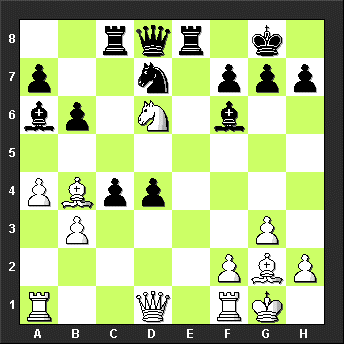
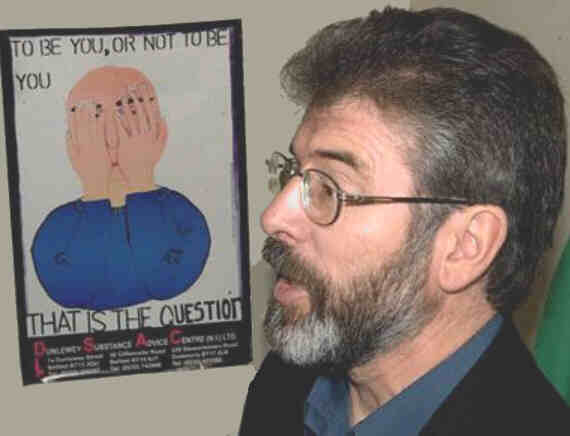 2002
UK imposes its rule on Northern Ireland.
2002
UK imposes its rule on Northern Ireland.
 Deaths
Deaths 2002
Carla Bergamin, 40, her widowed mother Teresa Bergamin, brother Sergio Bergamin
and his wife Margherita Bergamin, retired neighbors Decio Renato Guerra
and wife Laura Guerra, one other man, and Mauro Antonello, 40,
Carla's ex-husband (they separated in 2000), a night watchman, who at 08:45,
with some 40 shots from four legal guns from his collection, kills the seven
and then himself, in via Parini 5 and 3 [photo >], Chieri,
20 km south-east of Turin, Italy. Carla's and Mauro's daughter, 7, has left
on the school bus a few minutes earlier to go to Borgo Venezia Elementary
(the bus driver Antonio Lancellotti had instructions from Carla never to
let Mauro take the girl off the bus). The neighborhood is known as Borgo
Venezia, all the victims are of Venetian origin. — La prima ad essere
caduta è stata la ex moglie. Agli spari accorrono i coniugi Guerra che vengono
a loro volta uccisi. Mauro Antonello salta poi la recinzione che separa
il numero civico 5 dal numero 3 ed entra in un' officina laboratorio dei
Bergamin, specializzata in lavorazioni tessili. Lì ammazza due donne, una
è Margherita Bergamin, la moglie di Sergio, l'altra la persona di cui non
si conoscono ancora le generalità. Poi, nel giardino fra le due case, incontra
Sergio e Teresa Bergamin e li uccide. Infine sale in mansarda, si siede
sul divano, si punta il revolver alla tempia e fa fuoco togliendosi la vita.
Daniele e Andrea Bergamin, di 18 e 20 anni, figli di Sergio e Margherita,
si sono salvati perchè sono usciti di casa pochi prima della strage: Daniele
per andare a Castelnuovo Don Bosco (paese a pochi chilometri da Chieri),
dove frequenta un istituto tecnico, Andrea per un corso di informatica.
2002
Carla Bergamin, 40, her widowed mother Teresa Bergamin, brother Sergio Bergamin
and his wife Margherita Bergamin, retired neighbors Decio Renato Guerra
and wife Laura Guerra, one other man, and Mauro Antonello, 40,
Carla's ex-husband (they separated in 2000), a night watchman, who at 08:45,
with some 40 shots from four legal guns from his collection, kills the seven
and then himself, in via Parini 5 and 3 [photo >], Chieri,
20 km south-east of Turin, Italy. Carla's and Mauro's daughter, 7, has left
on the school bus a few minutes earlier to go to Borgo Venezia Elementary
(the bus driver Antonio Lancellotti had instructions from Carla never to
let Mauro take the girl off the bus). The neighborhood is known as Borgo
Venezia, all the victims are of Venetian origin. — La prima ad essere
caduta è stata la ex moglie. Agli spari accorrono i coniugi Guerra che vengono
a loro volta uccisi. Mauro Antonello salta poi la recinzione che separa
il numero civico 5 dal numero 3 ed entra in un' officina laboratorio dei
Bergamin, specializzata in lavorazioni tessili. Lì ammazza due donne, una
è Margherita Bergamin, la moglie di Sergio, l'altra la persona di cui non
si conoscono ancora le generalità. Poi, nel giardino fra le due case, incontra
Sergio e Teresa Bergamin e li uccide. Infine sale in mansarda, si siede
sul divano, si punta il revolver alla tempia e fa fuoco togliendosi la vita.
Daniele e Andrea Bergamin, di 18 e 20 anni, figli di Sergio e Margherita,
si sono salvati perchè sono usciti di casa pochi prima della strage: Daniele
per andare a Castelnuovo Don Bosco (paese a pochi chilometri da Chieri),
dove frequenta un istituto tecnico, Andrea per un corso di informatica.

 1917
Margaretha Geertruida Zelle Macleod "Mata Hari" executed by firing
squad
1917
Margaretha Geertruida Zelle Macleod "Mata Hari" executed by firing
squad